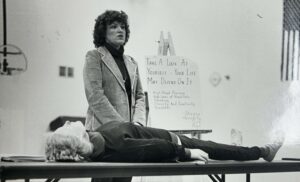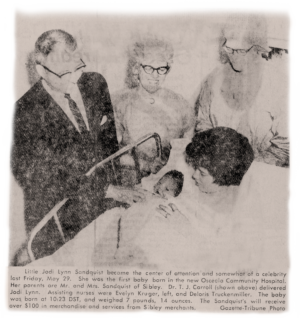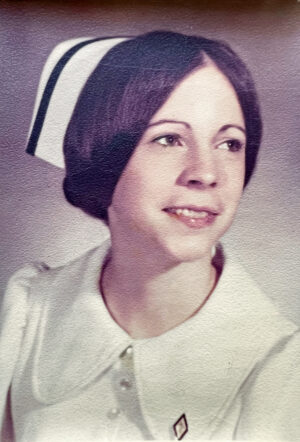
60th Anniversary
By Scott R Helmers, MD
With the 60th anniversary of opening of what is now Osceola Regional Health Center I am grateful for an opportunity to add recollections.

Osceola Hospital, located at 502 Second Avenue in Sibley, began in 1914.

Schoon Hospital, located at 509 Ninth Street in Sibley. Operated from 1935 – 1947.

Original hospital, located at 818 Fifth Street in Sibley, was started in 1911. Original accommodations for 15 patients. The annual admissions totaled 200 patients, with an average of 6 patients daily.
Having grown up in Sibley, I know what went before, and I was there for how this hospital came into being. I know that during the 1940s there were 3 hospitals in Sibley, essentially the upstairs area of the doctors’ offices. I entered the world in Schoon Hospital. I was told that family surgeries happened at Hough Hospital. But by the 1950s hospital care had all coalesced to the Osceola Hospital. I always remember how as an 8-year-old I was given inhalation ether as anesthesia for a tonsillectomy, and I then spent the night there.
By the late 1950s, however, as licensure and accreditation standards progressed, the doctor owned private Osceola Hospital was becoming obsolete. The Sibley community floundered in what to do. A potential estate bequest was offered as a seed for a new hospital, but it must have entailed public bonding and area taxation because two public votes failed with considerable controversy.
In the atmosphere of those failed votes, Sibley and surrounding area leaders of the time, true city fathers (and mothers!), banded together. After World War II the federal Hill-Burton Act offered some partial funding that could give a start to local hospital projects. The Sibley area group successfully applied for such funding. For the rest of needed money there was a vigorous pursuit of local personal contributions, and there was also sale of stock in a hospital corporation where the anticipated return was in community accomplishment, not financial benefit. The whole project drive encompassed more than just Sibley, of course. It became Osceola Community Hospital.
I wasn’t there for the actual opening, having graduated from high school the prior year and already occupied in pre-medical studies at Iowa State. I do recall friends from the 1964 class telling of volunteering to unroll sod for the hospital grounds. Though I missed the opening celebration, Osceola Community Hospital was soon to become a focal point for nearly 40 years of professional life for me.
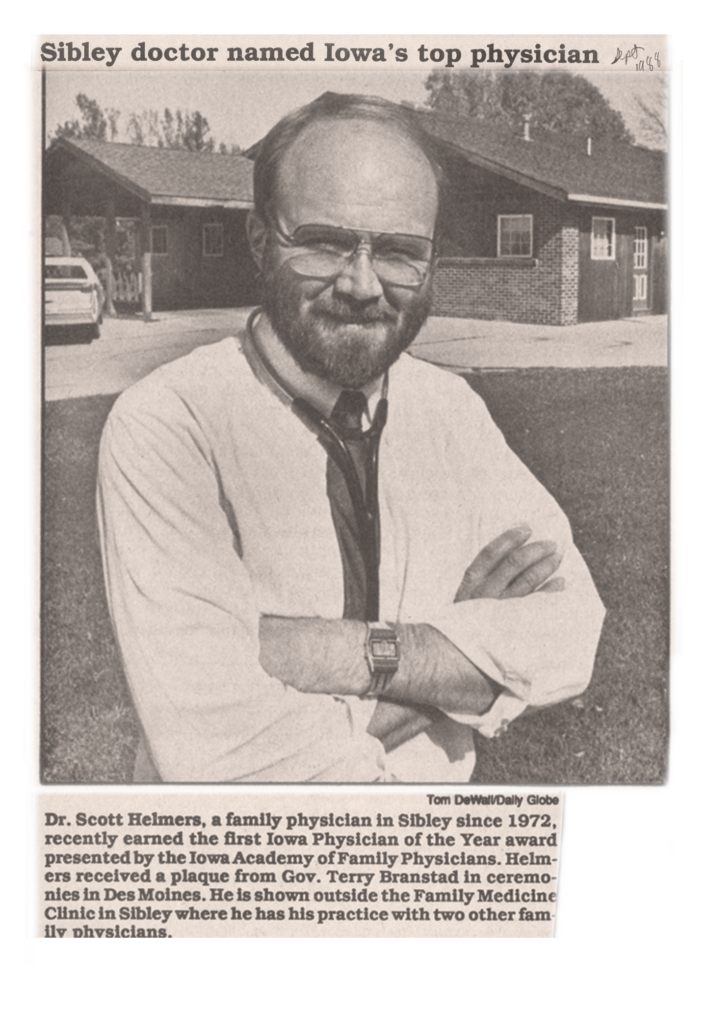
My professional association began in 1969. At that time third year medical students at the University of Iowa all were to spend a 2 week “preceptorship” with an Iowa family doctor to learn and understand practice life. I arranged mine with my childhood Sibley family doctor, then mentor, and later to be colleague and friend, Dr. TJ Carroll. I clearly recall attending hospital patients with Dr. Carroll. Cardiac monitoring was just arriving, and I sat in with hospital nurses in their instructional classes.
Approaching completion of internship-residency in Family Medicine in late 1971, my medical classmate and friend, Dr. William Hicks, and I looked to establish practice together. Many of those same city fathers were now the hospital Trustee Board. They graciously and enthusiastically welcomed our inquiries, especially as long time Sibley doctor, FB O’Leary, MD, was just retiring. We were also graciously received as borrowers by the then First National Bank when we purchased from
Dr. O’Leary the former Osceola Hospital building with its first story doctors’ offices. We commenced practice in 1972 in the same building with James Thomas, MD.
Though vanished from its name, I believe the term “community” stands out as elemental to the hospital’s inception and as descriptively emblematic of my 40 years serving there.
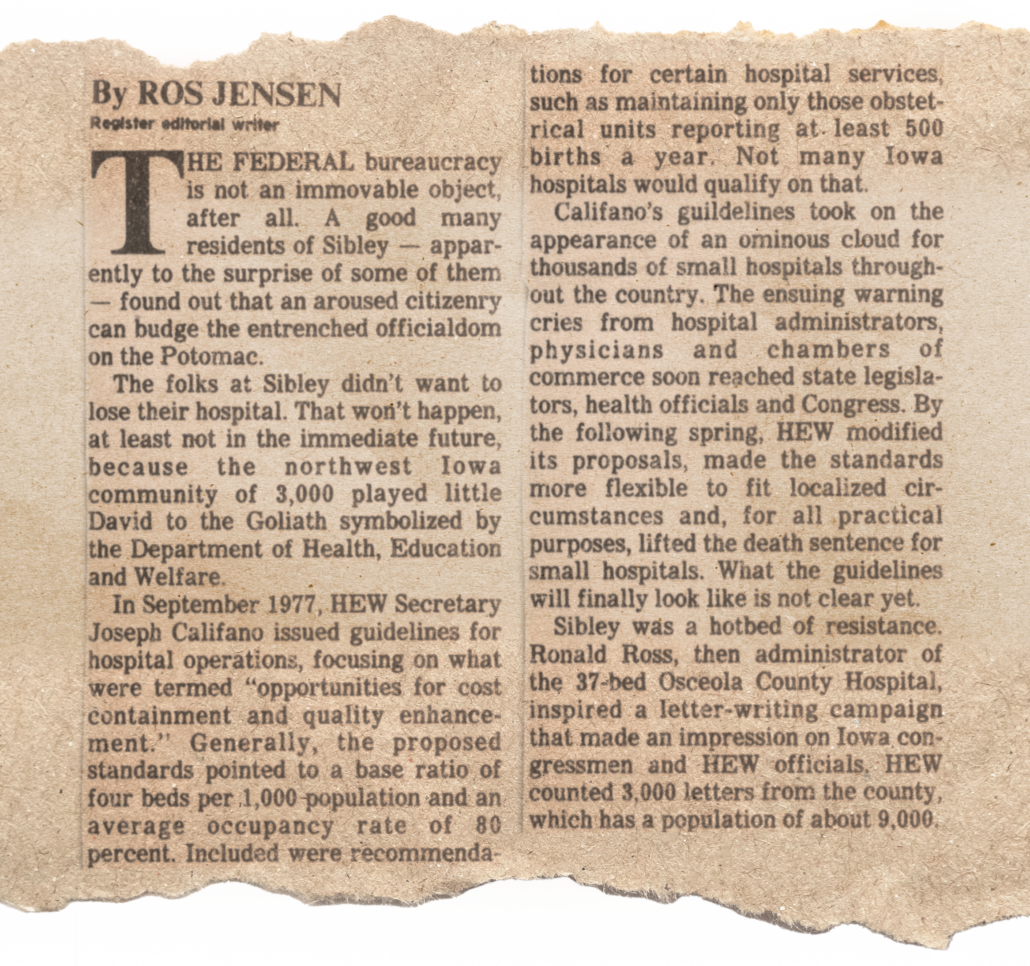
My most forever prominent recollection of this community hospital occurred in the late 1970s during what is labeled in health care circles as the Era of Health
Planning and Public Interest Policymaking. As new care techniques abounded and health care costs skyrocketed, there was near consensus that duplications must be controlled and centralization encouraged. Both Federal and State agencies arose. Small rural hospitals, which existed in nearly every Iowa community of the size of Sibley and larger, became targets in duplication reduction and centralization of services. I remember a Spencer doctor insisting that northwest Iowa hospital care must all be centralized to one hospital—Spencer, of course. A prominent Des Moines Register editorialist asserted that the numerous small rural Iowa hospitals were an out-of-date idea and must close. I do not recall that Osceola Community Hospital was a special target, but what was truly unique was how seriously that threat struck and how intensely the whole community reacted.
Having identified the appropriate agency, a community wide effort bombarded that agency with letters of protest. Grade schoolers penned letters, typically asking “what will happen to me and where will I go if I get sick?” The Sibley response was so unified and vigorous that it became one of two in the nation that the federal agency chose to study for understanding.
Osceola Community Hospital alone could not turn the tide, but ours surely typified the local resistance that led to disintegration of any policies of forced closures. And in truth, that whole Era slipped away as the very concept of evidence-based planning for public good began to fall out of favor. But most important and memorable was the solidarity and depth of public support that absolutely touched and gratified those of us trying our best to serve at the hospital. Perhaps never had we felt such “community.”
Within my 40 years, of course, are innumerable memories. A trying time was in the late 1980s when unfortunate circumstances reduced what had been 4 doctor town, and later a 5 doctor practice, to just we two, Dr. Bill Hicks and me. For 16 months we covered all hospital emergencies, all obstetric deliveries, of which there were many at that time, all hospital patients, and also, of course, our ongoing clinic office practice. We each took barely a few vacation days since that meant the other was left alone.
Then, and actually even in most years even when there were more of us physicians, holidays usually meant also being the lone doctor in the county. I cannot forget a Fourth of July when I think 7 persons arrived from a vehicular accident and a Thanksgiving Day with nearly the same number.
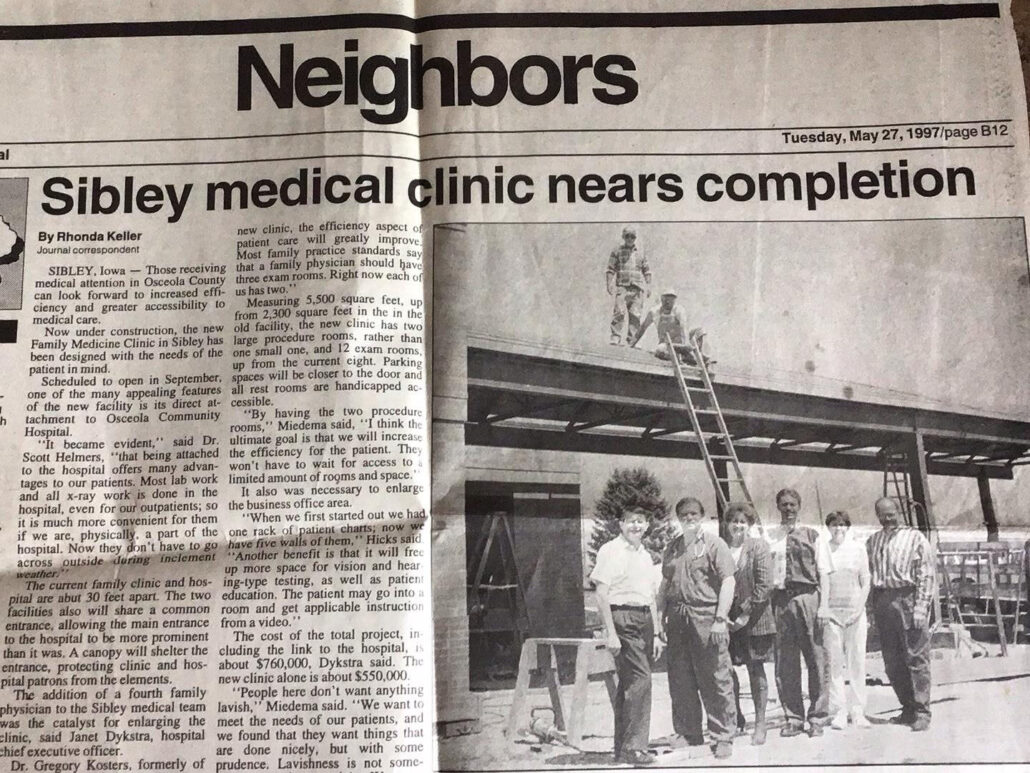
What stands out in my memory, however, is that I may have been lone, but I was never “alone.” The “community” with whom I was so fortunate to work was always there. Lab and X-ray personnel, and especially nurses, quickly found their colleagues who selflessly gave up part of their holiday to hurry in so we could serve everyone in need. It is this hospital “community” for which I must always be grateful. I remember so many fantastic people in housekeeping, dietary, custodial, administrative, maintenance, therapy, laboratory, X-ray, and particularly nursing on whom I so much depended. Within my memory are so many wonderful nurses, caring, dedicated, knowledgeable, there day and night, in all days and all weather, always willing to selflessly come to help. It is nurses who established the first modern hospitals, and it is nurses without whom no modern hospital can exist.
Named or not, it is the community around the hospital, the community they’re serving that must always be the most celebrated in this and all anniversaries. A Happy 60th Anniversary to the Osceola Regional Health Center.

“I enjoy the unique relationship between the clinic and the hospital and how we are able to collaborate and support each other. We are growing! We are excited for this expansion so we can continue to provide excellent care for our patients.”
“When I was working at the hospital, I loved getting to know people and their families. The staff here was supportive of everybody and it was such a good environment. I loved taking care of patients and I loved getting to know them. This hospital has always been known to give excellent care. Now as a volunteer, I love giving back to the community. It is the best volunteer opportunity. Every time I volunteer, I see someone I took care of and it makes me feel wonderful.”
“I loved my job in surgery. Nursing has changed so much from way back then to now. This was a good place for me to work all those years. Why drive out of town if you don’t have to?”
“At that time, we had lots of babies. When I was hired, I was mainly working in obstetrics (OB). We had like five doctors and they were all delivering babies. The OB department was a busy place. We were so busy before we even opened the doors.”
“Sometimes you don’t remember things, it’s just part of life. It’s so neat when people remember the impression that you made on their life. I also enjoy seeing those who I hired and trained, doing well. Those are the neat things.”
“I’ve always been a caregiver. With all I’ve seen, I’ve learned to help be an advocate for my patients. It’s always nice when people remember when I have helped them.”

